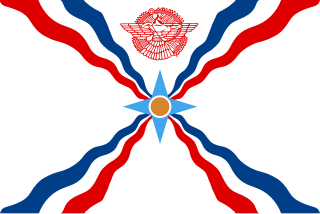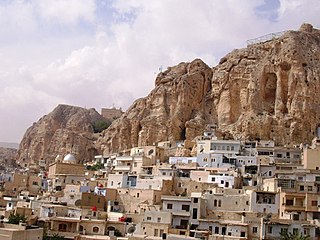Christian Aramaic may refer to:
Christian Aramaic may refer to:

The ancient Aramaic alphabet was used to write the Aramaic languages spoken by ancient Aramean pre-Christian tribes throughout the Fertile Crescent. It was also adopted by other peoples as their own alphabet when empires and their subjects underwent linguistic Aramaization during a language shift for governing purposes—a precursor to Arabization centuries later—including among Assyrians who permanently replaced their Akkadian language and its cuneiform script with Aramaic and its script, and among Jews, who adopted the Aramaic language as their vernacular and started using the Aramaic alphabet even for writing Hebrew, displacing the former Paleo-Hebrew alphabet..
Aramaic is a Northwest Semitic language that originated in the ancient region of Syria, and quickly spread to Mesopotamia, the Southern Levant and southeastern Anatolia where it has been continually written and spoken, in different varieties, for over three thousand years, today largely by Assyrians, Mandeans, and Mizrahi Jews.
Pascha or spelling variants may refer to:
The Syriac language, also known as Syriac Aramaic and Classical Syriac ܠܫܢܐ ܥܬܝܩܐ, is an Aramaic dialect that emerged during the first century AD from a local Aramaic dialect that was spoken in the ancient region of Osroene, centered in the city of Edessa. During the Early Christian period, it became the main literary language of various Aramaic-speaking Christian communities in the historical region of Ancient Syria and throughout the Near East. As a liturgical language of Syriac Christianity, it gained a prominent role among Eastern Christian communities that used both Eastern Syriac and Western Syriac rites. Following the spread of Syriac Christianity, it also became a liturgical language of eastern Christian communities as far as India and China. It flourished from the 4th to the 8th century, and continued to have an important role during the next centuries, but by the end of the Middle Ages it was gradually reduced to liturgical use, since the role of vernacular language among its native speakers was overtaken by several emerging Neo-Aramaic dialects.

Assyrians are an indigenous ethnic group native to Mesopotamia, a geographical region in West Asia. Modern Assyrians descend from Ancient Mesopotamians such as ancient Assyrians and Babylonians, originating from the ancient indigenous Mesopotamians of Akkad and Sumer, who first developed the civilisation in northern Mesopotamia that would become Assyria in 2600 BCE. Modern Assyrians may culturally self-identify as Syriacs, Chaldeans, or Arameans for religious, geographic, and tribal identification.
Chaldean may refer to:
Syriac may refer to:

Syriac Christianity is a branch of Eastern Christianity of which formative theological writings and traditional liturgies are expressed in the Classical Syriac language, a variation of the old Aramaic language. In a wider sense, the term can also refer to Aramaic Christianity in general, thus encompassing all Christian traditions that are based on liturgical uses of Aramaic language and its variations, both historical and modern.

The term Melkite, also written Melchite, refers to various Eastern Christian churches of the Byzantine Rite and their members originating in the Middle East. The term comes from the common Central Semitic root m-l-k, meaning "royal", referring to the loyalty to the Byzantine emperor. The term acquired religious connotations as denominational designation for those Christians who accepted imperial religious policies, based on Christological resolutions of the Council of Chalcedon (451).
The Jewish Neo-Aramaic dialect of Urmia, a dialect of Northeastern Neo-Aramaic, was originally spoken by Jews in Urmia and surrounding areas of Iranian Azerbaijan from Salmas to Solduz and into what is now Yüksekova, Hakkâri and Başkale, Van Province in eastern Turkey. Most speakers now live in Israel.
Western Neo-Aramaic, more commonly referred to as Siryon, is a modern Western Aramaic language. Today, it is spoken by Christian and Muslim Arameans (Syriacs) in only two villages – Maaloula and Jubb'adin, until the Syrian Civil War also in Bakhʽa – in the Anti-Lebanon Mountains of western Syria. Bakhʽa was completely destroyed during the war and all the survivors fled to other parts of Syria or to Lebanon. Western Neo-Aramaic is believed to be the closest living language to the language of Jesus, whose first language, according to scholarly consensus, was Galilean Aramaic belonging to the Western branch as well; all other remaining Neo-Aramaic languages are of the Eastern branch.

Judaeo-Aramaic languages represent a group of Hebrew-influenced Aramaic and Neo-Aramaic languages.

Maaloula or Maʿlūlā is a town in the Rif Dimashq Governorate in Syria. The town is located 56 km to the northeast of Damascus and built into the rugged mountainside, at an altitude of more than 1500 m. It is known as one of three remaining villages where Western Neo-Aramaic – said to be the language of Jesus – is spoken, the other two being the nearby, smaller villages of Jubb'adin and Bakhah.
Assyrian may refer to:
Syrian or Syriac Christians may refer to
Arameans are an ancient Semitic-speaking people in the Middle East.
The Eastern Aramaic languages have developed from the varieties of Aramaic that developed in and around Mesopotamia, as opposed to western varieties of the Levant. Most speakers are ethnic Syriac, although there are a minority of History of the Jews and Mandaeans, who also speak varieties of Eastern Aramaic.
Kurien is a male given name and family name common amongst the traditional aristocratic Saint Thomas Christians and Syrian Christians in Kerala, India.
Geoffrey Allan Khan FBA is a British linguist who has held the post of Regius Professor of Hebrew at the University of Cambridge since 2012. He has published grammars for the Aramaic dialects of Barwari, Qaraqosh, Erbil, Sulaymaniyah and Halabja in Iraq; of Urmia and Sanandaj in Iran; and leads the North-Eastern Neo-Aramaic DatabaseArchived 8 February 2018 at the Wayback Machine.